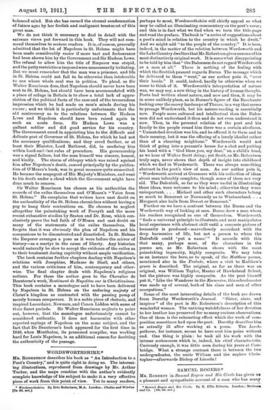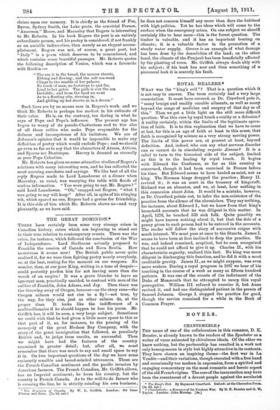SAMUEL ROGERS.* •
Me. ROBERTS in Samuel Rogers and His Circle has given US a pleasant and sympathetic account of a man who has many • Samuel Rogers emit His Circle. By B. Ellie Roberta. Lead= Metbncsa and Co. [10a. ed. net.)
claims upon our memory. It is chiefly as the friend of Fox, Byron, Sydney Smith, the Lake poets, the convivial Porson, "Anacreon" Moore, and Macaulay that Rogers is interesting to Mr. Roberts. In his book Rogers the poet is an entirely subordinate person, and his poetry is considered, if not frankly as an amiable indiscretion, then merely as an elegant accom- plishment. Rogers was not, of course, a great poet, but " Italy " is a poem which deserves to he remembered, and which contains some beautiful passages. Mr. Roberts quotes the following description of Venice, which was a favourite with Ruskin :-
" The sea is in the broad, the narrow streets, Ebbing and flowing ; and the salt sea-weed Clings to the marble of her palaces. No track of man, no footsteps to and fro, Lead to her gates. The path is o'er the sea Invisible ; and from the land we went As to a floating city, steering in, And gliding up her streets as in a dream."
Such lines are by no means rare in Rogers's work, and we think Mr. Roberts is perhaps too modest in his estimate of their value. He is, on the contrary, too daring in what he says of Pope and Pope's influence. The present age has begun to weary of its pseudo-Chattertons and to tire also of all those critics who make Pope responsible for the dulness and incompetence of his imitators. We are of Johnson's opinion that it would be impossible to make any definition of poetry which would exclude Pope ; and we should go even so far as to say that the characters of Atossa, Atticus, and Sporus are Dantesque. Hervey is damned as eternally as poor Pope Celestine.
Mr. Roberts has given us some attractive studies of Rogers's relations with many interesting men, and he has collected the most amusing anecdotes and sayings. We like best of all the reply Rogers made to Lord Lansdowne at a dinner when Macaulay, as usual, was wearying the table with floods of useless information. " You were going to say, Mr. Rogers P " said Lord Lansdowne. " Oh," snapped out Rogers, " what I was going to say will keep." After all, in spite of his stinging wit, which spared no one, Rogers bad a genius for friendship. It is this side of him which Mr. Roberts shows us—and very pleasantly, as we have said.



































 Previous page
Previous page